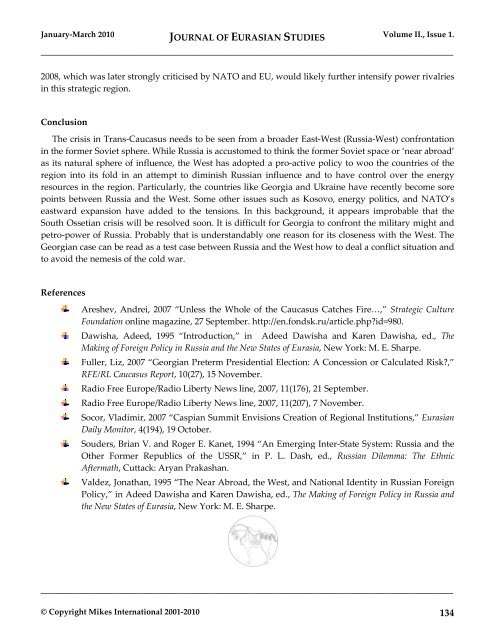EurasianStudies_0110..
EurasianStudies_0110..
EurasianStudies_0110..
Create successful ePaper yourself
Turn your PDF publications into a flip-book with our unique Google optimized e-Paper software.
January-March 2010 JOURNAL OF EURASIAN STUDIES Volume II., Issue 1.<br />
_____________________________________________________________________________________<br />
2008, which was later strongly criticised by NATO and EU, would likely further intensify power rivalries<br />
in this strategic region.<br />
Conclusion<br />
The crisis in Trans-Caucasus needs to be seen from a broader East-West (Russia-West) confrontation<br />
in the former Soviet sphere. While Russia is accustomed to think the former Soviet space or ‘near abroad’<br />
as its natural sphere of influence, the West has adopted a pro-active policy to woo the countries of the<br />
region into its fold in an attempt to diminish Russian influence and to have control over the energy<br />
resources in the region. Particularly, the countries like Georgia and Ukraine have recently become sore<br />
points between Russia and the West. Some other issues such as Kosovo, energy politics, and NATO’s<br />
eastward expansion have added to the tensions. In this background, it appears improbable that the<br />
South Ossetian crisis will be resolved soon. It is difficult for Georgia to confront the military might and<br />
petro-power of Russia. Probably that is understandably one reason for its closeness with the West. The<br />
Georgian case can be read as a test case between Russia and the West how to deal a conflict situation and<br />
to avoid the nemesis of the cold war.<br />
References<br />
Areshev, Andrei, 2007 “Unless the Whole of the Caucasus Catches Fire…,” Strategic Culture<br />
Foundation online magazine, 27 September. http://en.fondsk.ru/article.php?id=980.<br />
Dawisha, Adeed, 1995 “Introduction,” in Adeed Dawisha and Karen Dawisha, ed., The<br />
Making of Foreign Policy in Russia and the New States of Eurasia, New York: M. E. Sharpe.<br />
Fuller, Liz, 2007 “Georgian Preterm Presidential Election: A Concession or Calculated Risk?,”<br />
RFE/RL Caucasus Report, 10(27), 15 November.<br />
Radio Free Europe/Radio Liberty News line, 2007, 11(176), 21 September.<br />
Radio Free Europe/Radio Liberty News line, 2007, 11(207), 7 November.<br />
Socor, Vladimir, 2007 “Caspian Summit Envisions Creation of Regional Institutions,” Eurasian<br />
Daily Monitor, 4(194), 19 October.<br />
Souders, Brian V. and Roger E. Kanet, 1994 “An Emerging Inter-State System: Russia and the<br />
Other Former Republics of the USSR,” in P. L. Dash, ed., Russian Dilemma: The Ethnic<br />
Aftermath, Cuttack: Aryan Prakashan.<br />
Valdez, Jonathan, 1995 “The Near Abroad, the West, and National Identity in Russian Foreign<br />
Policy,” in Adeed Dawisha and Karen Dawisha, ed., The Making of Foreign Policy in Russia and<br />
the New States of Eurasia, New York: M. E. Sharpe.<br />
_____________________________________________________________________________________<br />
© Copyright Mikes International 2001-2010 134

















